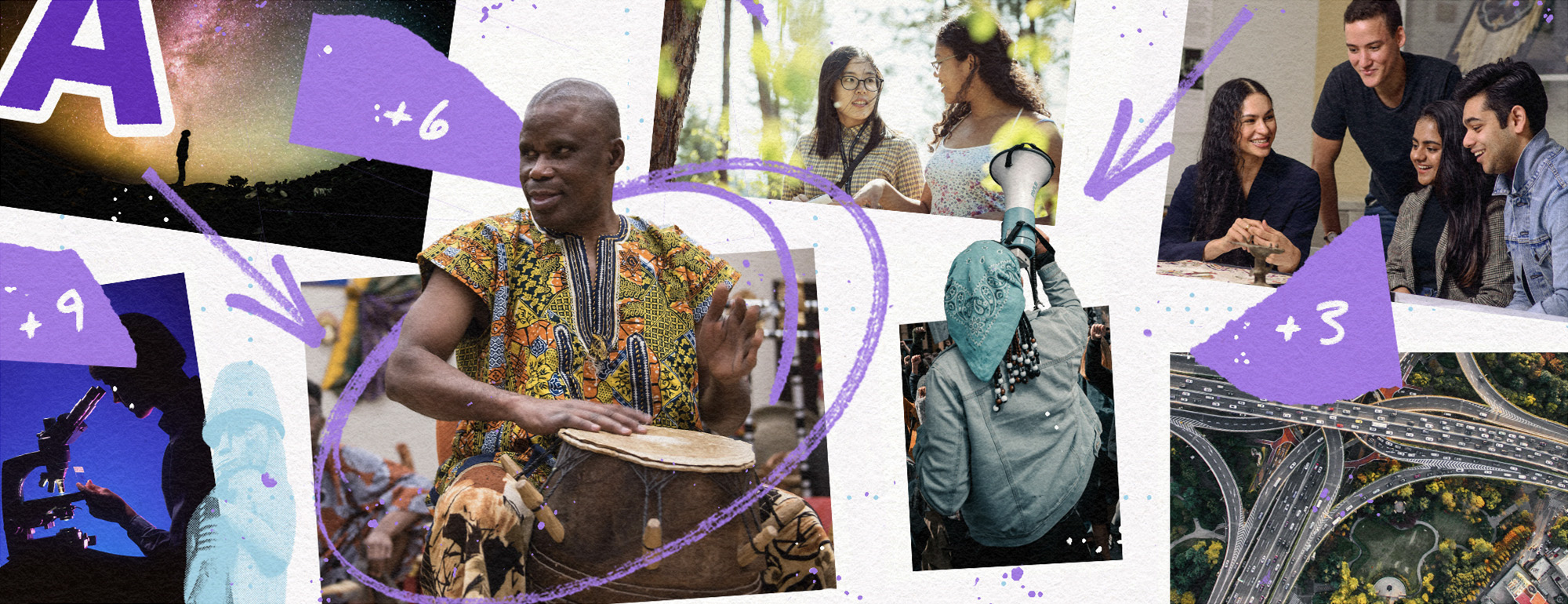Coming in 2024/25, the new Ways of Knowing Breadth Requirement is a flexible and cohesive learning experience where you are encouraged to explore and understand how various perspectives shape your connections to the Indigenous lands in British Columbia and with each other.
At the Faculty of Arts, we are deeply committed to interdisciplinary knowledge creation that builds awareness of the complexities, challenges, and incredible opportunities of the 21st century. Here, you have the freedom to design your own educational journey that aligns with your academic, career, and personal goals.
What are the new degree requirements?
All students in the Bachelor of Arts degree program must complete a minimum of 120 credits based on the following breakdown:
1. Writing and Research Requirements
2. Ways of Knowing Breadth Requirement
3. Outside Requirement
4. Upper-level Requirement
5. Arts Credit Minimum Requirement
Explore what you need to know
Overview of Ways of Knowing Breadth Requirement (WoK)
Ways of Knowing is made up of 21 credits distributed across two components: Place and Power and areas of breadth. You must complete:
- 9 credits (in one course code) from one of the Ways of Knowing breadth areas you find most relevant to your goals;
- 6 credits (in one course code) from another Ways of Knowing breadth area;
- 3 credits in the remaining Ways of Knowing breadth area; and
- 3 credits for Place and Power (which may also fall in one of the above or your major)
Your major or Honours program will fulfill the requirement in one of the areas of breadth. You are encouraged to select disciplines and courses that match your personal interests, post-graduate goals, and/or recommendations from your program advisor.
Place and Power
Place and Power introduces you to the history and current realities of the Musqueam Peoples and the land on which UBC is situated, along with the history and contemporary conditions of Vancouver and British Columbia. This requirement encourages you to place yourself “inside the story” in order to comprehend the systems of power, social relations, structures of inequality, and the diversity of cultural identities and communities at play.
Over time, Place and Power courses will be available in most Faculty of Arts units/departments. Take a sneak peek of the current approved course list below which will be updated on a regular basis. We encourage you to connect with an Arts Academic Advisor to stay up-to-date about the latest offerings.
The following Place and Power courses have been approved for the 2024/25 academic year. Please check back regularly to view more approved courses.
- ACAM 300: Dis/Orienting Asian Canada: Asian Canadian Histories for Our Times
- ANTH 329: Contemporary Indigenous Issues in a Global Perspective
- ARTH 262: Indigenous Arts of North America
- ARTH 377: Arts of the Northwest Coast Peoples: The South
- ASIA 220: Indigeneities in Asia and Asian Diaspora
- ASIX 300B: Indigenous Environmentalisms in Asia (Topics in Asian Studies Crossings)
- ASTU 200: Special Topics Place and Power
- ASTU 399: Special Topics Place and Power
- CENS 203: Arctic Art & Activism
- CENS 319: Languages, Place, and Power
- CRWR 220: Introduction to Creative Writing with an Indigenous Focus
- ENGL 228: From Literary Criticism to World Literatures: Introduction to Reading Place and Power in Vancouver and BC
- GEOG 328: Constructing Canada
- GEOG 355: Geographies of Urban Indigeneity
- GEOG 446B: Oceanic Geographies: Migration, Mobility, and Diaspora
- HIST 305: History of British Columbia
- HIST 400: The Practice of Oral History
- NORD 340: Sámi Histories and Cultures
- NORD 341: Indigenous Activism
- PHIL 102: Introduction to Philosophy II (Section 004, Place and Power)
- POLI 304: British Columbia Government and Politics
- RMST 326: Francophone Indigenous Literatures and Cultures
- SOCI 295: BC Disasters, Power, and Inequality
- SOCI 364: Built Environments
Last updated: April 2024
Disciplinary breadth
You are required to complete coursework across four areas of study. Your major or Honours program will encompass deep engagement in one of these areas. To complement this, you may choose how many credit hours – nine, six, or three – to spend in each of the three remaining Areas of Breadth, for a total of 18 credits.
Humanities and Creative Arts introduces you to interpretive inquiry and methods of analysis (e.g., textual, auditory/sonic, and visual) that enables you to assess how knowledge, world views, identities, and values are shaped and created within specific contexts and by institutions, ideologies, and media.
Humanities and Creative Arts Course Codes
- Asian Canadian Asian Migration Studies (ACAM)
- African Studies (AFST)
- Ancient Mediterranean and Near Eastern Studies (AMNE)
- Art History (ARTH)
- Asian Studies (ASIA)
- Asian Studies Crossings (ASIX)
- Canadian Studies (CDST)
- Central, Eastern and Northern European Studies (CENS)
- Cinema Studies (CINE)
- Creative Writing (CRWR)
- Critical Studies in Sexuality (CSIS)
- English (ENGL*)
- Film Production (FIPR)
- First Nations and Indigenous Studies (FNIS)
- German Studies (GMST)
- Gender, Race, Sexuality and Social Justice (GRSJ)
- History (HIST)
- Journalism (JRNL)
- Latin American Studies (LAST)
- Media Studies (MDIA)
- Medieval Studies (MDVL)
- Middle East Studies (MES)
- Music (MUSC)
- Nordic Studies (NORD)
- Philosophy (PHIL)
- Study of Religion (RGST)
- Romance Studies (RMST)
- Scandinavian (SCAN)
- Slavic Studies (SLAV)
- Theatre and Film (THFL)
- Theatre (THTR)
- Visual Arts (VISA)
- Writing Studies (WRDS*)
*Credits from these course codes can be applied towards this Breadth area with the exception of courses that satisfy the Writing Component.
Language as Meaning asks you to engage deeply with language study to build a foundation for long-term proficiency and/or mediate between languages in order to strengthen intercultural awareness in personal and professional contexts.
Language as Meaning Course Codes
- Classical Arabic (ARBC)
- Modern Standard Arabic (ARBM)
- American Sign Language (ASL)
- Asian Languages (ASLA)
- Chinese (CHIN)
- Cantonese (CNTO)
- Catalan (CTLN)
- Danish (DANI)
- First Nations and Endangered Languages Program (FNEL)
- French (FREN)
- German (GERN)
- Greek (GREK)
- Hebrew (HEBR)
- Hindi-Urdu (HINU)
- Indonesian (INDO)
- Italian (ITAL)
- Japanese (JAPN)
- Korean (KORN)
- Latin (LATN)
- Nepali (NEPL)
- Persian (PERS)
- Polish (POLS)
- Portuguese (PORT)
- Punjabi (PUNJ)
- Russian (RUSS)
- Sanskrit (SANS)
- Southeast Asian Languages (SEAL)
- South Asian Languages (SOAL)
- Spanish (SPAN)
- Swahili (SWAH)
- Swedish (SWED)
- Tibetan Languages (TIBT)
- Ukrainian (UKRN)
- Yiddish (YDSH)
Natural and Physical Sciences introduces you to disciplines that examine or utilize principles underlying the physical or natural world. In addition to understanding the central classifications and processes that animate a particular scientific field, you will gain an understanding of the scientific method applied in an exclusively positivist manner.
Natural and Physical Sciences Course Codes
- Astronomy (ASTR)
- Atmospheric Science (ATSC)
- Biochemistry (BIOC)
- Biology (BIOL)
- Biotechnology (BIOT)
- Cellular, Anatomical and Physiological Sciences (CAPS)
- Chemistry (CHEM)
- Cognitive Systems (COGS)
- Computer Science (CPSC)
- Data Science (DSCI)
- Engineering Physics (ENPH)
- Environmental Science (ENVR)
- Earth and Ocean Sciences (EOSC)
- Biochemistry and Forensic Science (FSCT)
- Geographical Sciences (GEOS)
- Integrated Sciences (ISCI)
- Marine Science (MRNE)
- Mathematics (MATH)
- Microbiology (MICB)
- Neuroscience (NSCI)
- Pharmacology and Therapeutics (PCTH)
- Physics (PHYS)
- Statistics (STAT)
Empowering personalized pathways





Social and Behavioural Systems, which draws from social science disciplines, introduces you to methods of analysis (e.g., scientific, interpretive, applied mathematics) that enables you to assess how individuals interact with each other through a host of social, economic, and political systems, as well as how the structure of these interactions impact societies.
Social and Behavioural Systems Course Codes